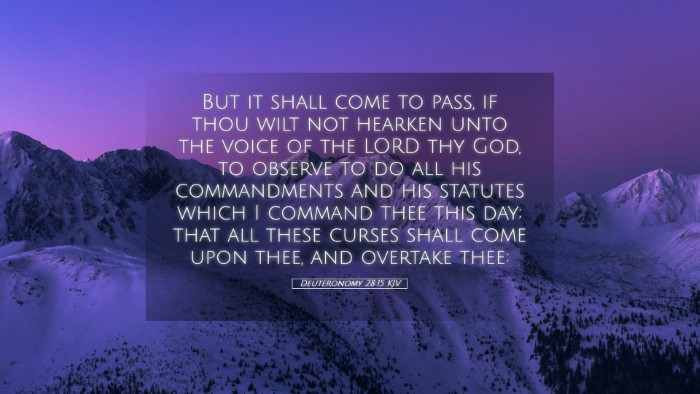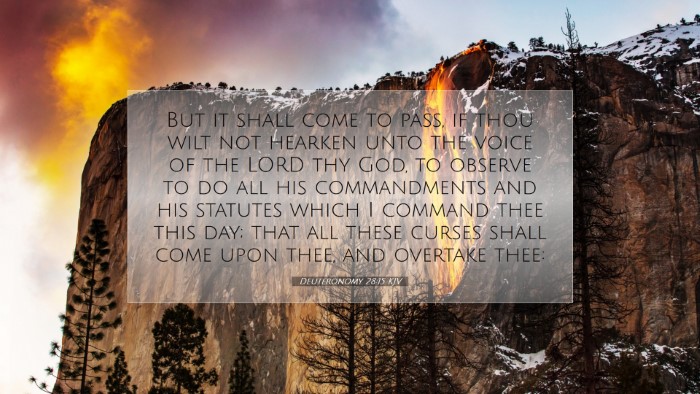Commentary on Deuteronomy 28:15
Deuteronomy 28:15 states, "But it shall come to pass, if thou wilt not hearken unto the voice of the LORD thy God, to observe to do all his commandments and his statutes which I command thee this day; that all these curses shall come upon thee, and overtake thee:" This verse is pivotal as it introduces a solemn declaration of the consequences accompanying disobedience to God’s commands.
Context of the Passage
The context of Chapter 28 of Deuteronomy is crucial as it delineates the blessings for obedience and the curses for disobedience. Moses, speaking to the Israelites before they enter the Promised Land, emphasizes the importance of fidelity to God. The chapter is divided into two distinct sections: the first (verses 1-14) discusses the blessings that will follow obedience, while the latter (verses 15-68) details the severe consequences of disobedience.
Insights from Commentaries
Matthew Henry
Matthew Henry remarks on the gravity of the warnings presented in this verse. He notes that the phrase “if thou wilt not hearken” underscores the voluntary nature of disobedience and the ensuing consequences. Henry emphasizes that this verse serves as a foil to the blessings, illustrating the severe repercussions of rejecting God’s laws. He articulates that these curses are not arbitrary but rather a natural result of forsaking God’s ways, indicating that obedience is not merely a matter of external compliance, but rather an internal posture of the heart.
Albert Barnes
Albert Barnes provides a detailed examination of the terms of the covenant that God established with Israel. He highlights that God's laws were clear, and the expectation for Israel to abide by them was non-negotiable. Barnes points out that the consequences laid out in Deuteronomy serve both as a warning and as a theological reflection on the nature of God’s justice and mercy. He emphasizes that the primary motive for keeping the commandments should be love, and warns that failure to heed God’s voice leads to inevitable repercussions that not only affect the individual but the community as a whole.
Adam Clarke
Adam Clarke elaborates on the historical and cultural context of this verse. He notes that in ancient Israel, adherence to God's commandments was a communal obligation, implying that individual actions had collective consequences. Clarke asserts that the terms “curses” mentioned in the verse encompass not only physical calamities but also spiritual and relational estrangement from God. He warns that such disobedience can lead to a cycle of despair and ruin, urging readers to consider the broader implications of their choices.
Theological Reflections
Theologically, Deuteronomy 28:15 raises important questions about the character of God and human agency. It confronts readers with the notion of divine justice: if God is just, then disobedience must result in consequences. The verse serves as a reminder of the seriousness with which God views His covenant and the importance of obedience. It also underscores the reality of free will; God does not coerce compliance but desires sincere devotion and respect for His statutes, which leads to a more profound relationship between God and His people.
Applications
For pastors and spiritual leaders, this verse serves as a call to emphasize the importance of teaching obedience to God's commandments. The recognition of God’s sovereign voice is important for both personal piety and communal worship. It can encourage congregations to earnestly consider their spiritual walk in light of God’s expectations.
For scholars and students of theology, this passage invites deep exegetical study of its implications for understanding covenant theology. The dual outcomes of obedience and disobedience provide a framework for considering how contemporary faith communities respond to similar challenges today. The historical narrative of Israel serves as a precedent, suggesting that the moral truths embedded in this warning continue to hold relevance.
Conclusion
In summary, Deuteronomy 28:15 acts as a powerful admonition about the necessity of adherence to God’s commandments. With insights from the likes of Matthew Henry, Albert Barnes, and Adam Clarke, we are reminded that disobedience has consequences, not only in the spiritual realm but also in the practical life of individuals and communities. This verse thus not only serves as a warning but also as an invitation to reflect on the nature of our relationship with God, the importance of covenant fidelity, and the resulting blessings or curses that characterize our walk with Him.


